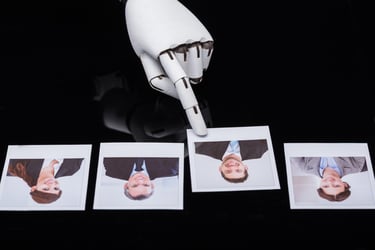How to Implement a World-Class RPO Program
Sometimes the Recruitment Process Outsourcing (RPO) model doesn’t drive the recruitment results an...

 The capabilities of artificial intelligence continue to grow. Some wonder whether AI will jeopardize job security for recruitment professionals. Although, 65% of research participants said they do not expect AI to threaten their jobs. Rather recruitment professional believe the introduction of AI will make their jobs easier through automation.
The capabilities of artificial intelligence continue to grow. Some wonder whether AI will jeopardize job security for recruitment professionals. Although, 65% of research participants said they do not expect AI to threaten their jobs. Rather recruitment professional believe the introduction of AI will make their jobs easier through automation.
As of 2020, 10% of companies have AI integrated into their HR departments. Another 36% plan on integrating AI into their HR departments. AI has already impacted manufacturing, retail, and real estate recruitment procedures. What industries will be affected next by the evolution of artificial intelligence in the recruitment process?
In this episode of Yoh's 'Back to Work' podcast series, our host, Joe McIntyre, and VP of Digital Transformations, Mike Dachenhaus, discuss the implications of AI in the recruitment process. Together let's recap the artificial intelligence applications and concerns in the talent acquisition process laid out by Mike Dachenhaus.
Sourcing is the proactive search for knowledgeable candidates. Sourcing allows you to tap into a repository of qualified candidates for current or prospective positions. Automation tools will streamline this process to identify suitable candidates quickly and effectively.
Programmatic Recruitment Advertising refers to all the comprehensive steps in advertising a job ad. Automation will optimize the visibility of these job postings to ensure the right candidate sees your ad at the right time.
Chatbots are AI widgets that help facilitate conversation. For HR applications, this means directing candidates to the correct point of contact (hiring manager, talent acquisition specialist, HR rep, etc.) to advance the recruiting process. Although 72% of candidates were under the impression they spoke with a recruiter, despite being informed beforehand the chatbot was an AI widget. This glaring statistic paints a vivid picture of the sophisticated capabilities of AI in the recruitment practices.
US lawmakers have contemplated the consequences of using AI in acquiring talent. In fact, just last year, New York City implemented a law restricting the use of machine-learning products in the hiring process. For companies considering the use of AI screening tools in the city, they must undergo a 'bias-audit' to ensure the instrument was not designed to discriminate against candidates.
Ultimately, recruitment is 'people-orientated.' If the entire hiring process is conducted through an AI bot, candidates might be discouraged from signing the offer letter because they have not gotten a glimpse of the people they'll work alongside. Therefore the human aspect of recruiting cannot be understated.
The adoption of AI in the recruitment process is ongoing. Embracing and learning new technologies will eventually be a requirement for recruitment professionals. Ultimately, AI is expected to control and automate laborious tasks to allow recruitment professionals to act primarily as consultants. Integrating AI will help level the playing field for the talent community and help businesses improve outcomes.
Listen to the full podcast episode to learn more about how the increased use of AI influences recruitment processes.

Sometimes the Recruitment Process Outsourcing (RPO) model doesn’t drive the recruitment results an...
January 18, 2017

We are all doing more work with fewer resources. In the U.S., worker productivity continues to grow...
February 01, 2018

Decided whether to maintain your in-house talent acquisition resources or outsourcing recruiting...
May 20, 2014